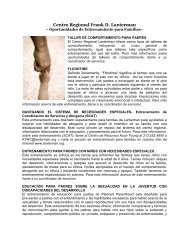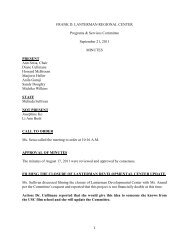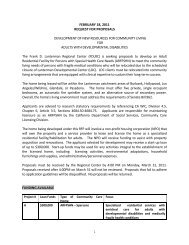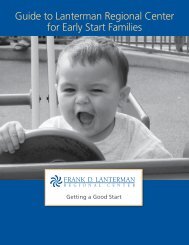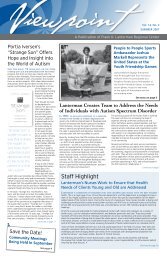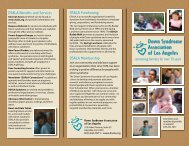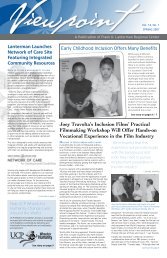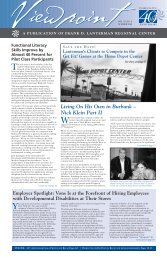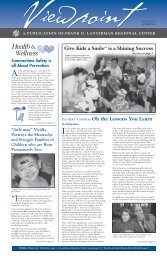Early Intervention Services - Frank D. Lanterman Regional Center
Early Intervention Services - Frank D. Lanterman Regional Center
Early Intervention Services - Frank D. Lanterman Regional Center
Create successful ePaper yourself
Turn your PDF publications into a flip-book with our unique Google optimized e-Paper software.
<strong>Frank</strong> D. <strong>Lanterman</strong> <strong>Regional</strong> <strong>Center</strong><br />
<strong>Center</strong>-Based <strong>Early</strong> <strong>Intervention</strong> <strong>Services</strong><br />
Service Standard<br />
Approved by the Board of Directors on May 26, 2010<br />
(Approved by the Department of Developmental <strong>Services</strong> July 23, 2010)<br />
<strong>Center</strong>-based Infant Development Programs are designed specifically for toddlers age<br />
2-3 who would benefit from social and learning experiences beyond what is available<br />
from an in-home program but whose significant global delays or severe medical or<br />
behavioral challenges would not allow them to benefit from a typical preschool. Their<br />
purpose is similar to that of the individualized services but they also allow for the child to<br />
socialize with peers in a structured environment.<br />
The regional center may purchase center-based services under the following<br />
circumstances:<br />
1) The infant/toddler is not eligible for a public school program;<br />
2) Based on the formal assessments, the IFSP team has determined that the child<br />
has functional or special needs which may be appropriately met by center-based<br />
services.<br />
Typically, part-time attendance is sufficient to meet the developmental needs of the<br />
child. The specific program and the number of days per week which are recommended<br />
for the child are determined by the severity of the child’s delay, the need to prevent<br />
regression, the presence of medical and/or physical concerns, the need for socialization<br />
opportunities, the home environment and the transportation resources of the family.<br />
Children enrolled in a center-based program may also receive supplemental therapies,<br />
including speech, occupational, or physical therapy.<br />
If the child is medically fragile, a medical release from the child’s physician may be<br />
required prior to the purchase of a center-based program.<br />
Reauthorization of <strong>Services</strong><br />
The need for continuation of early intervention services is assessed at the time of the<br />
semi-annual IFSP based on developmental monitoring and periodic reports of the<br />
child’s progress submitted by the center-based service. <strong>Services</strong> terminate when the<br />
child’s eligibility for the <strong>Early</strong> Start program ends at age 3.<br />
Exception<br />
If the child is currently enrolled in a center-based program purchased by the regional<br />
center and the child turns three during the months of July or August when the Public<br />
<strong>Center</strong>-based <strong>Early</strong> <strong>Intervention</strong> <strong>Services</strong> – Action Date: 9/3/10
school is not in session, the regional center may continue to purchase the center-based<br />
services until the child enrolls in the public school program.<br />
<strong>Center</strong>-based <strong>Early</strong> <strong>Intervention</strong> <strong>Services</strong> – Action Date: 9/3/10



